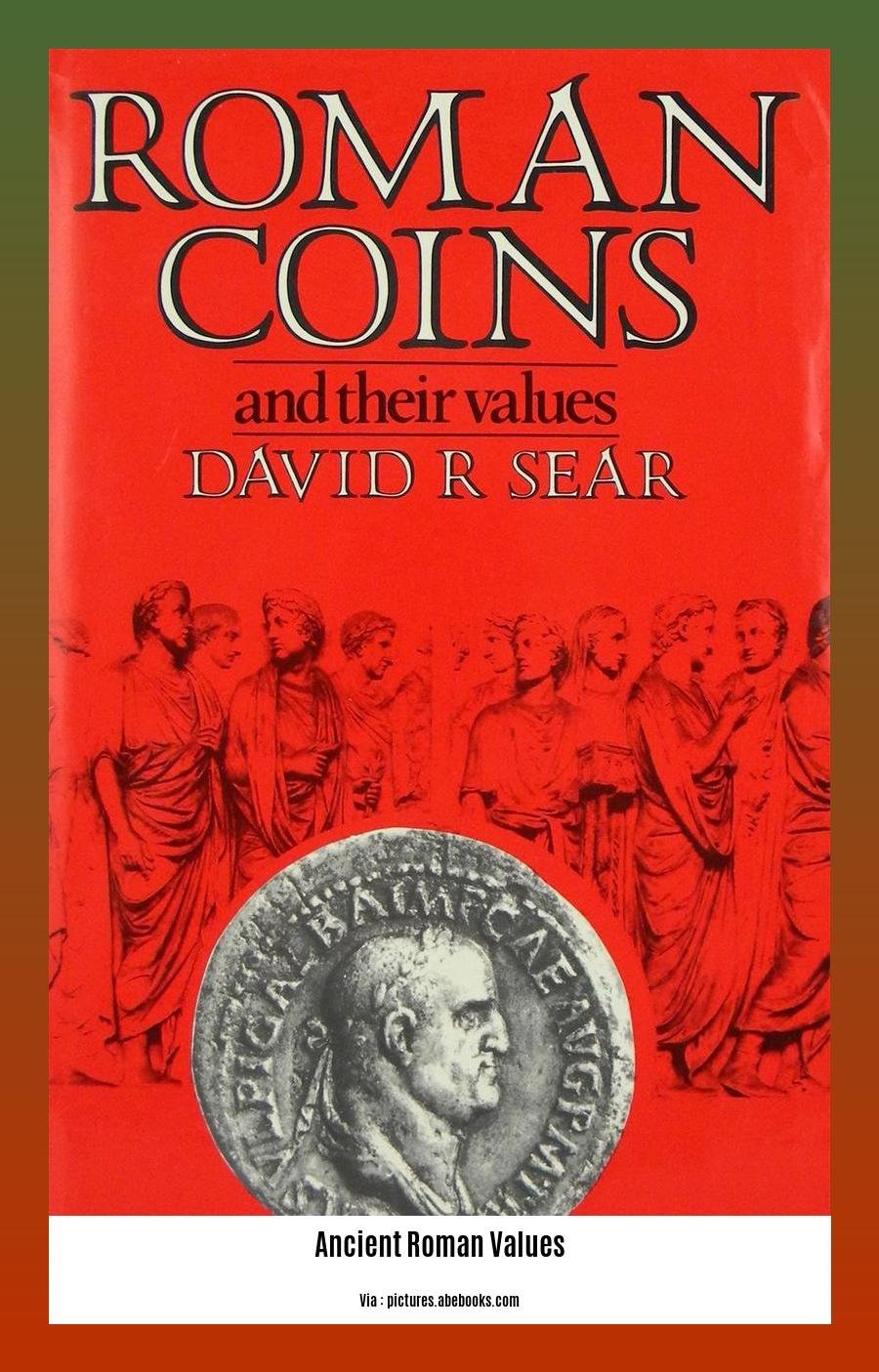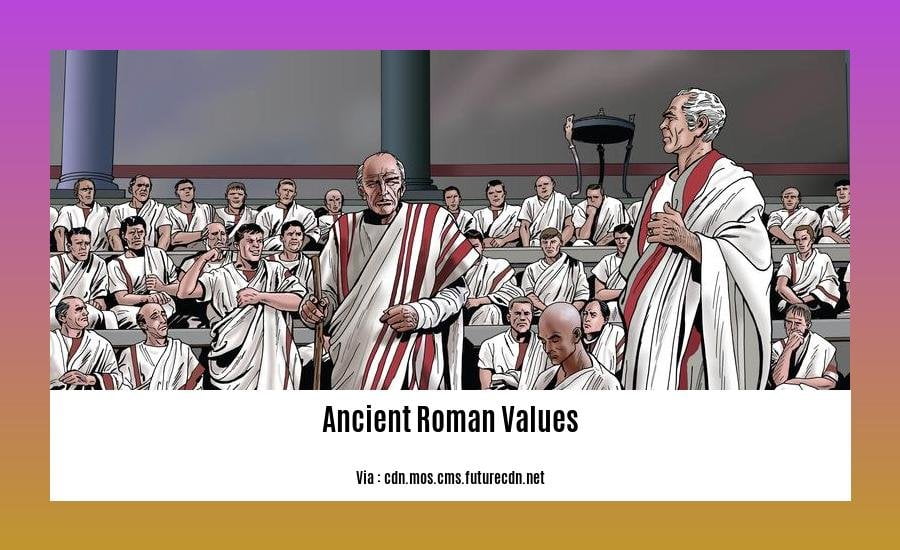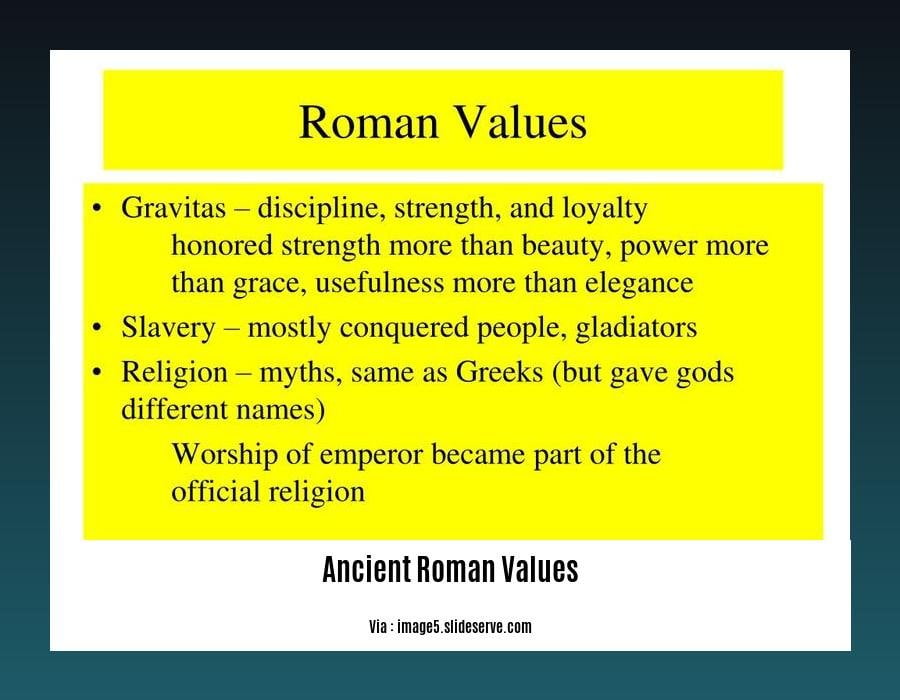Step back in time and discover the profound Ancient Roman Values that shaped one of the world’s most enduring civilizations. Imagine walking the bustling streets of ancient Rome, hearing the vibrant voices of its citizens, and feeling the pulse of a civilization at its height. What were the fundamental beliefs that shaped their world, their laws, and their daily lives? Let’s journey into the heart of Roman civilization and explore the captivating world of their values.

Ancient Roman Values
The ancient Romans were deeply invested in rules and order, and their values were the backbone of their civilization. These weren’t just abstract ideals; they were deeply rooted beliefs that influenced everything from everyday interactions to the governance of their vast empire. These values weren’t simply codified; they were woven into the very fabric of Roman society.
One of the most fundamental concepts was “mos maiorum,” which translates to “the way of the ancestors.” This reverence for tradition meant adhering to the practices and beliefs of their forefathers, which they believed was essential for maintaining stability and order. Anything new or different, referred to as “res novae,” was often met with suspicion, as change was often associated with instability and potential turmoil.
However, Roman values extended beyond simply clinging to the past. At the core of their society were several key values that actively guided their actions and decisions:
| Value (Latin) | Meaning | Why it Mattered to the Romans |
|---|---|---|
| Virtus | Bravery, Courage | Being strong and brave, willing to fight and even die for Rome, was the ultimate ideal. |
| Fides | Loyalty, Trustworthiness | Staying loyal to your family, friends, and the Roman state was crucial for a united society. |
| Pietas | Piety, Religious Duty | Romans believed in honoring the gods and following religious traditions. |
| Gravitas | Seriousness, Dignity | Taking your responsibilities seriously and acting with dignity were highly valued. |
| Auctoritas | Authority, Influence | Respect for authority figures and institutions was paramount in maintaining order. |
These values weren’t just empty words; they were principles that Romans genuinely believed were crucial for the success and prosperity of their civilization. They instilled these ideals in every aspect of their lives, from child-rearing practices to the governance of their vast empire.
What’s fascinating is that the impact of these Ancient Roman Values can still be felt today! Concepts like duty, loyalty, and respect for the law—ideas we often take for granted—have roots in ancient Rome. It makes one wonder, what values do we hold today that might shape the world hundreds of years from now?
Our understanding of ancient Roman society continues to evolve. New archaeological discoveries and interpretations of historical texts are constantly adding to and refining the picture. While there are still many unknowns and ongoing debates among historians about the nuances of Roman values and their practical implications in daily life, one thing remains clear: exploring the values of ancient Rome provides a fascinating glimpse into a civilization that continues to captivate and influence us even today.
Let us delve deeper into the timeless significance of these Roman values, appreciating their profound impact on the world we inhabit today.
- Did you know that ancient Sumerians had unique naming conventions? Discover the fascinating history of ancient Sumerian names and their significance in shaping the region’s identity.
- From the legendary ancient swords of India to the secrets they hold, step into the past and witness the craftsmanship of these iconic weapons that shaped battles and empires.
- Investigate the symbolism of harmony and serenity through ancient symbols of peace. Uncover the stories, meanings, and cultural significance behind these enduring representations of tranquility.
- Journey back in time to explore the ancient Tamil queen names list, a testament to the leadership, power, and influence wielded by these remarkable rulers in ancient Tamil history.

What were the three main Roman values?
We’ve touched upon the Roman proclivity for rules and order, but what were the core values that underpinned this societal structure? Let’s delve into three prominent values that shaped the Roman world:
Loyalty: More Than Just a Word
The image of Roman legions marching in perfect formation speaks volumes about the importance of loyalty in Roman society. It was about more than just friendship; it was a deep-seated obligation to prioritize the needs of the group over one’s own. Romans were expected to be fiercely loyal to their family, their community, and above all, to Rome itself. This loyalty was a driving force behind their military discipline, social cohesion, and ultimately, the longevity of their empire.
Bravery: Facing the Unknown with Your Chin Up
The Roman Empire was built through conquest, a path that inevitably led to confronting formidable adversaries. The Romans believed that facing challenges head-on, with courage and unwavering determination, was paramount not only for military victory but also for personal growth. The gladiators in the arena epitomized this ideal, showcasing their skills and confronting danger with unwavering courage, becoming symbols of Roman bravery.
Honor: A Matter of Integrity
For the Romans, honor wasn’t just about being a “good person”; it was a code of conduct, a way of life. It meant adhering to one’s principles, exercising self-discipline, and always striving to do what was right, even when faced with difficult choices. It was about earning respect through actions and building a reputation that brought pride to oneself and one’s family.
These three values—loyalty, bravery, and honor—were not isolated concepts but rather intertwined facets of the Roman identity. Whether one was a soldier, a senator, or a farmer, these values were central to what it meant to be Roman. They formed the bedrock of their society and played a significant role in the empire’s enduring legacy.
Thinking about it further:
- Some scholars suggest that the emphasis on these values might have shifted over time, particularly during the transition from the Roman Republic to the Roman Empire. Exploring how these values may have been interpreted differently during various periods of Roman history offers a deeper understanding of their evolution.
- It’s also worth considering how these values manifested in the daily lives of ordinary Roman citizens. Did they genuinely embody these values, or were they ideals that people aspired to? This question delves into the complexities of lived experiences within a society known for its adherence to a strict moral code.
It’s critical to remember that our understanding of ancient Rome is constantly evolving as new discoveries are made. While we can identify key values like loyalty, bravery, and honor, the ways in which these values were expressed and experienced likely varied depending on individual circumstances and social standing.
What did ancient Romans value the most?
Beyond togas and gladiators, the ancient Romans possessed a distinct set of values that served as the glue holding their society together. They believed in a life imbued with good character, bravery, and unwavering loyalty—their ancient recipe for a successful life. Respecting their elders and honoring the gods were non-negotiable principles, much like one wouldn’t want to disappoint a beloved grandparent.
At the heart of it all was the concept of “virtue,” which transcended simply being a “good person.” It encompassed having the courage to face challenges head-on and always striving to do what was right, even when it was difficult. Loyalty, or “fides” as they called it, was their secret ingredient for a strong and stable society—a promise whispered through generations: “We’ve got each other’s backs, no matter what.” This unwavering loyalty, coupled with their deep respect for authority and tradition, contributed to the Roman Empire’s remarkable longevity.
Family was paramount to the Romans. They took immense pride in their ancestors, much like one might boast about a war hero in the family. Protecting their family name and upholding their honor was of paramount importance—a precious legacy passed down through generations.
Justice also held a prominent place in their value system. They were staunch advocates for fairness and ensuring everyone was treated equitably. They believed in the power of wisdom and courage, not just on the battlefield, but in the everyday lives of their citizens. These values served as their toolkit for navigating the complexities of ancient Roman life.
Key Takeaways:
- The ancient Romans championed bravery, loyalty, and good character as fundamental virtues.
- Respecting the gods and their elders was a given, much like adhering to the rules of a sacred game.
- Family was their bedrock, valuing their loved ones and their family’s reputation above all else.
- They prized fairness, wisdom, and facing challenges with courage as essential qualities for a fulfilling life.
Exploring Further:
While we’ve scratched the surface of what Romans valued, our understanding is constantly evolving as archaeologists unearth new clues. Some scholars suggest that these values might have been interpreted and lived out differently depending on social status and individual experiences. It’s akin to piecing together a giant puzzle, where each new discovery adds a piece to the bigger picture.
Don’t stop here if you’re fascinated by ancient Rome! Dive deeper into the world of Roman values and discover how their beliefs shaped one of history’s most influential civilizations.
What values were important to the ancient Romans?
Imagine strolling through the bustling streets of ancient Rome. You’d quickly realize that ideas like honor, bravery, and loyalty weren’t just fancy words – they were the real deal, shaping everything from how people acted on the battlefield to how they treated their families.
More Than Muscle: The Virtues That Made a Roman
Being a Roman wasn’t just about conquering lands; it was about embodying a set of core values. First and foremost, there was “virtus,” which went far beyond physical strength. It was about facing down fear and doing what was right, especially when danger was present. Then there was “fides,” which encompassed loyalty – to your family, your friends, and to Rome itself. This wasn’t a value taken lightly; it was the glue that held their society together. Romans also placed great importance on “mos maiorum,” which essentially meant respecting the traditions and ways of their ancestors. They believed this practice fostered stability and served as a reminder of their shared identity.
Living with the Gods: A Blend of Beliefs
Religion wasn’t just something Romans did on holidays; it was deeply intertwined with their daily lives. They believed in a pantheon of gods, each with their own distinct personality and role to play. Romans would offer sacrifices and prayers to these gods, hoping for protection and good fortune. This deep sense of devotion, known as “devotio,” demonstrated their humility and gratitude towards the divine forces they believed shaped their world. This fusion of religious belief and everyday life meant that festivals and rituals weren’t merely celebrations but vital expressions of Roman identity.
Family First: The Heart of Roman Society
Here’s a point that might surprise you: the might of the Roman Empire wasn’t solely built on legions and armies. It was built upon the strength of its families and communities. Romans held family ties in high regard. They firmly believed that a close-knit family was the bedrock of a strong and thriving society. Loyalty to your kin was paramount, and it wasn’t uncommon for several generations to live in close proximity, forming these large, interconnected families known as “gens.” This provided a deep sense of belonging and ensured everyone looked out for one another.
Beyond Strength: Seeking Justice and Knowledge
While renowned for their military prowess, the Romans also placed immense value on honesty, fairness, and the pursuit of knowledge. They believed that a civilized society required a strong sense of justice, which they termed “iustitia.” They even developed a sophisticated system of laws to ensure everyone, regardless of their social standing, was treated fairly. Education was another cornerstone of Roman society. They viewed it as a means for personal and societal progress. Romans encouraged the study of philosophy, public speaking, and even the arts, believing that knowledge was key to a well-rounded life.
What We Can Learn from the Romans
While the Roman Empire might be a relic of the past, their values continue to resonate in the present day. Think about it: courage, loyalty, respect, family, justice, education – these are all principles we still value in the 21st century. Studying the Romans reminds us that some values are timeless and that even the mightiest empires are built on a foundation of strong principles.
Keep in mind that our understanding of ancient Roman values is still evolving! Archaeologists and historians are constantly uncovering new evidence that provides fresh perspectives on Roman life. Who knows what fascinating discoveries await us in the future?
What Were the Moral Values of Ancient Rome?
We’ve delved into the world of ancient Rome, but what were the underlying principles that guided their moral compass? What did they deem “good” or “bad”? Like any culture, their ideas about right and wrong were interwoven with their daily lives.
One of their core values was virtue. This wasn’t just about being a good person; it was about having the courage to do what was right, even when no one was watching. It was about honor, integrity, and living a life consistent with these principles, from the battlefield to the marketplace.
Loyalty and piety were also highly regarded. This meant being faithful to your family, your city, and your gods. Family was paramount in Rome, and respect for elders was a given. And the gods? Well, let’s just say you wouldn’t want to be on their bad side. Mythology played a significant role in their lives, and pleasing the gods was a serious matter.
Romans also placed a high value on seriousness. Life wasn’t all togas and gladiatorial combat. Discipline, self-control, and hard work were expected. They believed in enjoying the fruits of your labor but avoided excesses, emphasizing moderation in all things.
Respect and authority were also fundamental to their social structure. Roman society was hierarchical, with everyone having their designated place. Respect for elders, leaders, and the government was expected. Questioning authority was generally frowned upon.
It’s crucial to remember that our understanding of ancient Rome is constantly evolving. Historians are always unearthing new artifacts and interpretations, literally and figuratively. Writings, ruins, and artifacts all provide clues to this ancient civilization, much like piecing together a giant puzzle. And sometimes, new discoveries require us to adjust our understanding of the past.
One thing is certain: these values – virtue, loyalty, seriousness, respect – were not just words to the Romans. They underpinned their entire civilization, shaping their laws, their art, their worldview. And it’s fascinating to see their echoes in our own ideas about ethics and society today.
What Were Roman Key Values?
Building upon our exploration of Roman principles, let’s delve deeper into the core values that defined their society. Think of these values as the bedrock of their worldview—the guiding principles that shaped their relationships, their everyday lives, and their place in the world.
Virtus: This multifaceted concept went beyond mere physical strength. It encompassed a strong moral compass rooted in courage, honor, and keeping one’s word. Picture a Roman soldier facing down an enemy without flinching—that’s virtus in action.
Fides: This value extended beyond simple faithfulness; it represented an unwavering dedication to one’s family, city, and allies. Breaking a promise was a grave offense, and betrayal was unthinkable. This profound sense of loyalty was instrumental in binding Roman society together.
Pietas: The Romans were deeply devout, and pietas, or piety, was highly valued. They believed in honoring the gods through rituals, sacrifices, and festivals. However, pietas wasn’t just about appeasing deities; it extended to showing respect for one’s ancestors and upholding the traditions of Roman society.
Gravitas: Remember the saying “Rome wasn’t built in a day”? While coined much later, this saying epitomizes the Roman value of gravitas, or seriousness. They valued discipline, self-control, and keeping one’s emotions in check. Thoughtful consideration and a degree of formality were expected in their approach to life.
Deferentia: This emphasis on order extended to social interactions. Respect, or deferentia, played a pivotal role in Roman culture. Showing deference to those in positions of authority—whether a political leader, an elder, or someone of a higher social standing—was an expectation deeply ingrained in their worldview.
Auctoritas: This value represented the power and influence held by those in leadership positions. Romans placed a high premium on respecting and obeying those in charge, whether a general commanding troops or a father leading a family.
These intertwined values—virtus, fides, pietas, gravitas, deferentia, and auctoritas—weren’t just lofty ideals; they were the threads that wove the fabric of Roman society. They influenced their political systems, military conquests, art, literature, and even their daily routines.
It’s important to acknowledge that our understanding of ancient Rome is constantly evolving. Our interpretations of their “key values” are based on historical sources, archaeological findings, and the writings of Roman thinkers. There’s always room for debate and new discoveries that can refine our perspectives.
While we may not have a perfectly complete picture, exploring these values provides a captivating window into the Roman mindset. It allows us to understand what they strived for, what they held sacred, and ultimately, what made them tick.
What were the Roman values and religion?
Let’s delve into the intriguing world of Roman beliefs, where religion wasn’t just a Sunday activity but a fundamental aspect of everyday life. The Romans believed that staying on the good side of the gods was paramount—a cosmic insurance policy, if you will. Keeping the gods content through offerings, prayers, and rituals meant a greater likelihood of blessings and good fortune coming their way.
Early Roman religion wasn’t primarily about sainthood or moral purity. It was more about maintaining a harmonious relationship with powerful forces. However, as time passed, ideas about morality began to intertwine with their religious beliefs. Virtues like pietas (deep respect for family, gods, and duty), fides (trustworthiness), and humanitas (essentially, being a decent human being) emerged as important principles. These weren’t just lofty ideals; they became integrated into the fabric of Roman society, shaping how people interacted with one another and lived their lives.
Speaking of foundational elements, loyalty, family, and respect for authority were non-negotiable for the Romans. Loyalty to one’s family and to Rome itself was practically sacred. These values were also reflected in their religious practices. Ancestor worship was highly significant, and families would often pray for divine protection. It all ties together, doesn’t it?
But where did these Roman gods originate? The Romans weren’t shy about borrowing a deity or two (or a dozen!) from their neighbors. Etruscan and Greek mythology were significant influences. Take Jupiter, Juno, and Minerva, for instance. Yep, those heavy hitters were initially Etruscan deities. And those captivating Greek myths? They wove their way into Roman beliefs and rituals as well. This melting pot of influences contributed to the rich tapestry of Roman religion.
To sum it all up:
- Keeping the Gods Happy: Romans believed that appeasing the gods was essential for success, protection, and overall well-being. Rituals, prayers, and offerings were all part of their strategy for maintaining a harmonious relationship with the divine.
- Morality Makes an Entrance: As Roman religion evolved, moral virtues such as pietas, fides, and humanitas became increasingly important, influencing both personal and social conduct.
- Family, Loyalty, Respect: These core Roman values weren’t just societal norms; they were deeply intertwined with their religious beliefs and practices, further solidifying their importance.
- Borrowing from the Best: Roman religion was open to inspiration from other cultures, incorporating deities and rituals from Etruscan and Greek mythology, creating a unique blend of beliefs.
Want to learn more? Check out:
- Beard, M., North, J., & Price, S. (1998). Religions of Rome: A Sourcebook. Cambridge University Press.
Remember, our understanding of ancient cultures is always evolving. New discoveries constantly provide fresh insights. Who knows what other fascinating revelations about Roman values and religion lie dormant, waiting to be unearthed?
What are the 3 important ideas of Roman philosophy?
We’ve explored the values and beliefs that shaped Roman society, but what about their philosophical musings? When it came to contemplating the world and their place in it, three primary schools of thought held sway in ancient Rome. These philosophies weren’t just confined to academic circles; they influenced how ordinary Romans lived their lives.
First up, we have Epicureanism. Now, before you conjure up images of non-stop revelry, it’s important to note that while this philosophy emphasizes pleasure, it’s not about unbridled hedonism. The Epicureans, followers of the philosopher Epicurus, believed that true happiness stemmed from living a balanced life. They valued good company, intellectual pursuits, and yes, indulging in life’s pleasures, but always in a responsible and moderate manner. Think of it as finding joy in the simple things without going overboard.
Next, we have Stoicism. Founded by Zeno of Citium, this school of thought emphasized self-control and inner peace above all else. The Stoics believed that true freedom came from accepting whatever life threw your way—both the good and the bad—and not allowing emotions to rule your actions. They stressed living in harmony with nature and using reason as a guide. In a nutshell, Stoicism is about maintaining composure in the face of adversity and focusing on what you can control.
Last but not least, we have Skepticism, a philosophy that might sound familiar. Skeptics, with Pyrrho of Elis being a prominent figure, believed that absolute certainty is unattainable. They advocated for approaching life with an open mind, questioning assumptions, and embracing a healthy dose of doubt. Skepticism encourages humility and reminds us that we don’t have all the answers.
So, there you have it – Epicureanism, Stoicism, and Skepticism. These three philosophies offered distinct perspectives on how to live a good and meaningful life. They demonstrate that the Romans were thinkers who grappled with some of the same existential questions we still ponder today: What is the path to happiness? How should we live our lives? Is there such a thing as absolute truth?
What is the 3 Rome Theory?
We’ve explored how Roman values shaped their society, but the “3 Rome Theory” flips this idea on its head. This theory isn’t about how Romans lived within their empire but rather how their legacy supposedly transferred to two other major powers after the fall of Rome. Intriguing, isn’t it?
Imagine it as a historical game of tag! The “3 Rome Theory” proposes that the glory, power, and even the essence of Rome—its values, laws, and culture—didn’t simply vanish. Instead, they were passed on, like a torch, to two other major players in history.
First Rome: The Roman Empire
This one’s fairly straightforward. It refers to the original Roman Empire, from its humble beginnings as a city-state to its expansion into a vast empire that dominated much of Europe, North Africa, and the Middle East. This is the Rome of gladiators, emperors, groundbreaking legal systems—the foundation upon which the entire theory rests.
Second Rome: The Byzantine Empire
After the Western Roman Empire fell in 476 AD, the eastern half, centered on Constantinople (present-day Istanbul), lived on. This was the Byzantine Empire, which considered itself the direct continuation of Rome. The Byzantines preserved Roman laws and traditions, spoke Greek (the common language in the Eastern Roman Empire), and their emperors still used titles like “Caesar.” The “3 Rome Theory” suggests that they weren’t merely influenced by Rome—they were Rome, just version 2.0.
Third Rome: Moscow, Russia?
This is where the theory takes an interesting—and somewhat controversial—turn. After the Byzantine Empire fell to the Ottoman Turks in 1453, the title of “Third Rome” was claimed by… Moscow! This idea took hold in the late 15th and 16th centuries within the rising Russian state, particularly during the reign of Ivan the Terrible.
Why Moscow? After the fall of Constantinople, Moscow became the center of Orthodox Christianity. The Grand Prince of Moscow even married the niece of the last Byzantine emperor. This fueled the idea that Moscow had inherited the mantle of protector of the Orthodox faith and was destined to lead the world into a new era as the heir to Rome’s legacy.
Hold on, though—not so fast!
While the “3 Romes” narrative is captivating, historians are quick to point out its flaws. It oversimplifies complex historical processes and served largely as political propaganda used by rulers to legitimize their power and ambitions.
Consider this:
- The Byzantine Empire, while Roman in many ways, also developed its own unique character and evolved independently over time.
- Moscow’s claim to being the “Third Rome” was self-proclaimed and based on a specific interpretation of history that was not universally accepted, even at the time.
The Takeaway
While not entirely historically accurate, the “3 Rome Theory” is a compelling lens through which to view history. It prompts us to think about how empires rise and fall, and how ideas and legacies can be perpetuated (and sometimes manipulated) by those who come after. The theory underscores that history isn’t merely a collection of facts; it’s an intricate tapestry woven with interpretations, claims, and counterclaims.
What were the 3 parts of the Roman Empire?
The Roman Empire’s vastness and power are undeniable. But governing such a massive expanse of territory was no simple feat. Imagine it as a gargantuan puzzle, with three main pieces:
1. The Heart of It All: Italy
Just as the heart pumps lifeblood throughout the body, Italy was the heart of the Roman Empire. It was home to Rome, the epicenter, the ultimate seat of power. Rome was the empire’s headquarters, where crucial decisions were made, laws were passed, and Roman culture flourished. It was a vibrant hub teeming with life, political intrigue, and those legendary gladiatorial contests.
2. The Essential Ingredients: The Provinces
Every empire needs resources, much like ingredients are essential for baking a cake (a really powerful cake, in this case!). That’s where the Provinces came in. Picture them as the vast territories conquered by the Roman legions, stretching across Europe, reaching into Asia, and even touching the sands of Africa. These provinces supplied everything the empire needed to function—grain, gold, soldiers, and yes, even slaves. They were the backbone of the empire, providing the muscle and resources to keep the gears turning.
3. Friends with Benefits: The Allies
Rome was undeniably powerful, but even they understood that global domination couldn’t be achieved in complete isolation. So, they made friends — powerful friends. These were the kingdoms, cities, and tribes that weren’t under direct Roman rule but wisely chose to stay on their good side. These allies acted as a safety net, providing additional troops when needed, assisting with diplomacy, and even granting access to resources that Rome might not have otherwise had.
But there’s a catch!
It wasn’t always smooth sailing. Some scholars argue that this simple three-part division doesn’t fully capture the intricate realities of the Roman Empire. The relationships between Rome, its provinces, and its allies were constantly in flux—rebellions erupted, power struggles ensued, and the lines between “province” and “ally” could become blurred. This dynamic tension adds layers of complexity to the narrative of the Roman Empire, making it a captivating historical saga.
While it’s convenient to conceptualize the Roman Empire in three parts, it’s essential to remember that the story is far more nuanced than that. To truly grasp the essence of this ancient superpower, we need to delve deeper, exploring the complexities, appreciating the ever-shifting dynamics of power, culture, and influence. It’s a journey worth taking.
What were the three main periods in Roman history?
Roman history, much like a captivating novel, can be divided into three distinct chapters—periods that witnessed the rise, transformation, and eventual decline of this mighty empire.
Regal Period (753-509 BCE)
This era represents Rome’s origin story. It all began with a humble city-state ruled by kings who held absolute power. These early rulers laid the groundwork, establishing the political and social structures that would shape Rome’s future. But life under kings wasn’t always idyllic; these rulers could be ruthless, often claiming their authority was divinely ordained.
Republican Period (509-27 BCE)
This chapter marks a pivotal turning point. Tired of monarchical rule, the Romans established a republic, transferring power to elected officials and a senate. This period witnessed Rome’s expansion into a formidable power, fueled by military conquests. Their territorial ambitions, however, led to internal strife, political maneuvering, and even civil war. It was an era characterized by both impressive growth and internal turmoil.
Imperial Period (27 BCE – 476 CE)
Enter the emperors! With Augustus Caesar’s rise to power, the Roman Republic transitioned into the Roman Empire. Augustus ushered in the Pax Romana, a period of relative peace and prosperity that lasted for approximately two centuries. It was during this time that the empire reached its territorial zenith, stretching across vast swathes of land. However, overexpansion and internal conflicts eventually weakened the empire, contributing to its gradual decline and eventual fall.
It’s crucial to remember that our understanding of these periods is based on interpretations of historical evidence, and historians are constantly refining their understanding of the past. New discoveries may challenge existing theories and shed new light on this fascinating civilization. While these three periods provide a useful framework for understanding Roman history, the story of ancient Rome continues to unfold.












